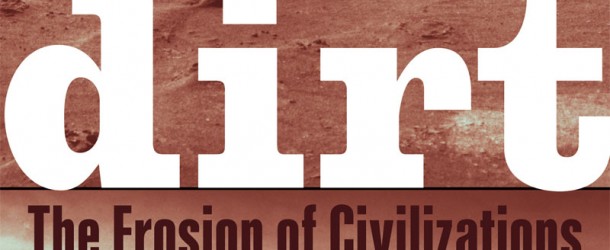
Dirt: The Erosion of Civilizations by David R. Montgomery is not a book outlining marijuana growing techniques.  Dirt traces agriculture back to its earliest practitioners, explains its importance to the rise of great civilizations, and demonstrates how poor soil husbandry has led to the collapse of some of the world’s most influential empires. The following passage shows the vital importance of agriculture to the ancient Romans.
Marcus porcius Cato (234-149 BC) wrote De agri cultura, the oldest surviving Roman work on agriculture. Cato focused on grape, olive, and fruit growing and distinguished nine types of arable soils, subdivided into twenty-one minor classes based mainly on what grew best in them. Â He called farmers the ideal citizens and considered the agricultural might of its North African rival, Carthage, a direct threat to Roman interests. (Dirt, p 59)
Montgomery goes on to explain how Carthage was viewed as a threat by Rome because of its superior farmland. Armies need food; and food comes from farmers.  Motivated largely by Cato’s political campaign against Carthage, Rome took Carthage in 146 BC.  As the story goes, the Roman general Scipio Aemilianus Africanus plowed salt into the fields of Carthage to put an end to this southern threat once and for all.
Dirt spans the entire history of global agriculture, pausing to elaborate on certain key developments. In one of my favorite chapters, Montgomery describes how nitrates where needed in great quantity for manufacturing munitions during World War II.  Almost overnight, after the end of the war this need for synthetic nitrates ended.  Chemicals created by expansive infrastructure that had been developed to win a war needed to be re-purposed.  The sudden availability of cheap nitrates helped usher in an agricultural revolution which spanned from 1943 to the late 1970’s.  Here is another excerpt from Dirt, page 197.
The agricultural output of industrialized countries roughly doubled in the second increasing reliance on manufactured fertilizers. Â Global use of nitrogen fertilizers tripled between the Second World War and 1960, tripled again by 1970, an half of the twentieth century. Â Much of this new-found productivity came from then doubled once more by 1980. Â The ready availability of cheap nitrogen led farmers to abandon traditional crop rotation and periodic fallowing in favor of continuous cultivation of row crops.
Author David Montgomery, a Professor of Earth and Space Sciences at the University of Washington, offers very compelling arguments linking the importance of soil to the development of civilization throughout human history. Â A steadfast proponent of organics, manure, crop rotation and no-till agriculture, Montgomery offers proven alternatives to modern agriculture practice.Â
While Dirt may seem slightly off-topic to some Marijuana Growers HQ readers, it offers an important history of agriculture over the ages. Â Agricultural science is moving forward at an exponential rate. Â Only through understanding its history can we plot its future.
Dirt: The Erosion of Civilizations – Book Review,









Looking forward to reading this one. I’ve been working on “The LIbertarian Reader: Classic and Contemporary Writings from Lao-Tzu to Milton Friendman” edited by David Boaz. I think you might enjoy it when I’m done.